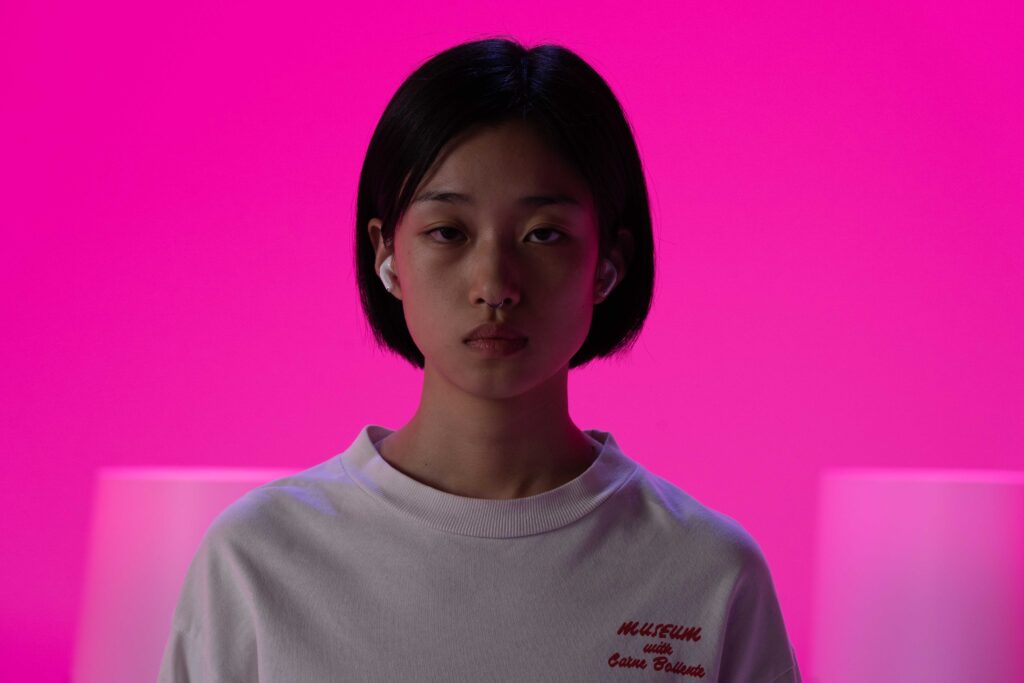
In Yoko Yamanaka’s latest film, Desert of Namibia, 21-year-old protagonist Kana flails violently against her surroundings as if trying to escape the container of her existence. She is impulsive — cheating on one lover and abusing the next — and struggles to communicate with others. Watching this young woman do such a poor job of living her life is painful at times. Yamanaka’s film defies cliché by depicting an unpleasant side of girlhood that many would prefer to deny exists. A young woman herself, Yamanaka gained critical acclaim in 2017 for her first film, Amiko, which she directed at the age of 20, and last year, she won an International Federation of Film Critics (FIPRESCI) award at the Cannes Film Festival for Desert of Namibia. In Namibia, we aren’t given much context for Kana’s erratic behavior, but Yamanaka insists that there’s nothing deviant about it. What seems strange and unacceptable is only because we’re deluding ourselves into believing there’s one correct way to be “normal.” Try as we may to understand Kana, it is our urge to rationalize her motivations that created her.
“When we see another person’s life, we’re really only seeing a small sliver of them,” Yamanaka said in a recent interview with FAR–NEAR. “A lot of people want to label and explain: ‘this person is like this.’ It’s precisely because I don’t like that tendency [to characterize people] that I made this film.”
The full conversation between FAR–NEAR Senior Editor Ariana King and Director Yoko Yamanaka follows.
山中瑤子の最新作『ナミビアの砂漠』では、21歳の主人公・カナが、自らの存在の容器から逃れようとするかのように、激しく周囲にもがき苦しむ様子が描かれている。彼女は衝動的で、一人目の彼氏を裏切り、二人目の彼氏には暴力を振るう。他者とのコミュニケーションができない。この若い女性が、あまりにも不器用に人生を生きようとする姿は見苦しい。山中監督の作品は、少女時代の「見たくない側面」を描くことで、便利なステレオタイプを拒否している。山中監督は、2017年に20歳で監督したデビュー作『あみこ』で批評家から高い評価を受け、昨年は『ナミビアの砂漠』でカンヌ国際映画祭にて国際映画批評家連盟(FIPRESCI)賞を受賞した。
『ナミビアの砂漠』では、カナの不安定な行動についての背景説明はほとんど与えられないが、山中はそれが逸脱したものとは考えていない。それが異常で受け入れがたく見えるのは、私たちが「普通」であるべき姿を勝手に決めつけているからだ。私たちがカナを理解しようとすればするほど、実はその「理解したい」という欲望こそが、彼女という存在を作り出しているのだと山中は語る。
「他人のことが自分が見えてるその人が一部しかないということがみんなわかっている。」と、山中は最近FAR–NEARのインタビューで語った。「やっぱりみんなラベリングしたいし、『この人はこう』っていうわかりやすい何かが欲しいというのが、それが嫌だったから映画を作ったはずです。」
以下は、FAR–NEARのシニアエディター、アリアナ・キングと山中瑤子監督の対談をお届けします。
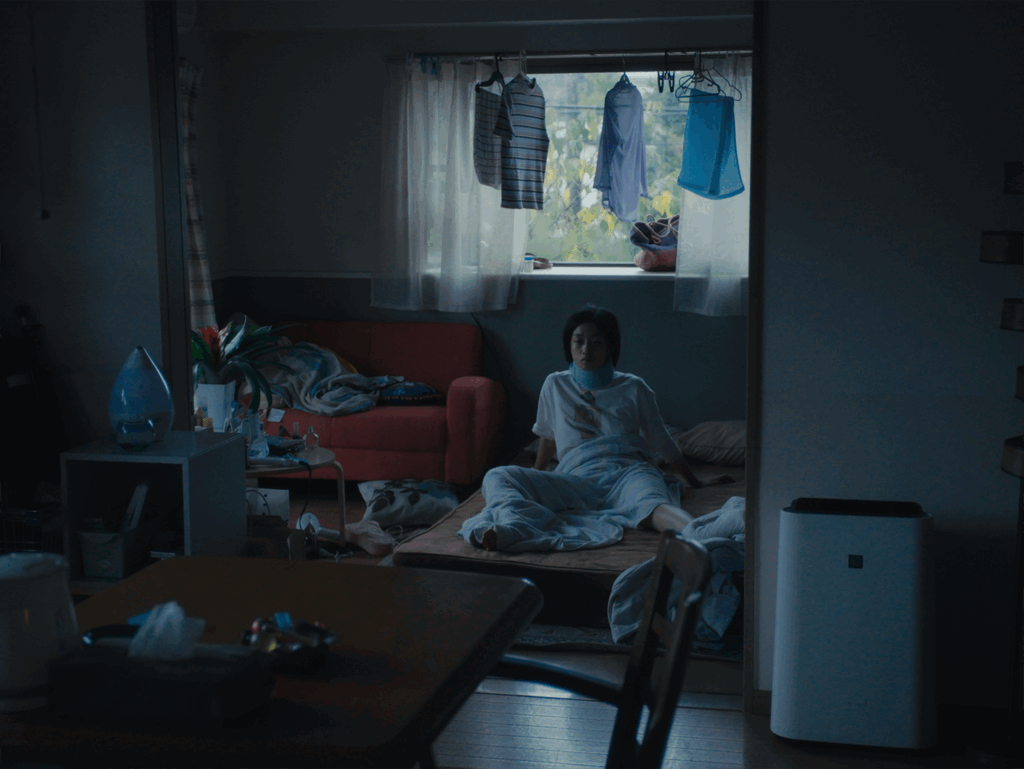
“Women get angry, they raise their voices, they use their fists — setting aside whether these things are good or bad, I wanted to express that her actions aren’t unusual.”
Ariana What kind of person is the protagonist, Kana?
「ナミビアの砂漠」の主人公のカナはどんな人ですか。
Yoko I imagined and wrote Kana as an ordinary 21-year-old girl in Tokyo. I didn’t think of her as a strange character, just as a girl dealing with being 21 — achieving independence from family, and living alone in an extremely chaotic place like Tokyo.
私にとっては、カナは結構普通の若い女性だと思って書いてました。変わっているキャラクターだと思っていないっていうか、そういう21歳という設定にしているのも家族との家から独り立ちして、東京というすごいカオティックな場所で一人暮らしするときにはこう起こりうる混乱の状態の中にいる普通の子かなと思って書いてました。
Ariana You describe her as “normal,” but what is normal?
「普通」という言葉を使いましたが、普通とは何ですか。
Yoko In response to the film, I heard many people say things like, “she’s strange,” or “I wouldn’t want to be involved with this kind of person” — calling her “abnormal.” So I say “normal” to respond to those comments. What I mean is that women get angry, they raise their voices, they use their fists — setting aside whether these things are good or bad, I wanted to express that her actions aren’t unusual.
まあ、結構その映画を見た感想で「変わっている」とか、「こんな人とは関わりたくない」とか、「異常」だというふうに見る人も多かったので、それに対応する言葉として異常ではないという意味で「普通」と言ったから、ああいうふうに女性が怒ったり、大きな声を出したり、手が出たりすることが別に良いことか悪いことか置いといて、おかしなことではないという意味ですね。
Ariana Viewers used words like “strange”/“different”?
観客は「変わっている」とか、そういう言葉を使っていますか。
Yoko They say she’s “strange” or “this kind of person doesn’t exist.” But on the other hand, some people said, “I was reminded of my own youth,” or “Kana is me.” There were lots of different responses.
「変わっている」とか「こんな人はいない」と言う人もいるし…でも一方で、「自分が若いときを思い出した」とか「カナは私だ」というふうに言う人もいれば…「こんな人は見たことがない」という人も。色々ですね。
Ariana When I saw the film, I thought, “Oh that’s me,” even though of course I don’t resort to violence. But I understood her impulse and felt like I could understand her. You mentioned the chaos of Tokyo as an explanation for her way of being, but what other factors affected Kana in her reactions to the world?
実は私は映画を見て、「あ、私だ」と思って…もちろん暴力を振いませんが、そういう精神があります。カナが理解できたかなと思っていました。東京のカオスという原因でこう生きていたと言っていましたが、何か他の理由でカナはこうなりましたか。
Yoko It’s not just the chaos of Tokyo but the modern world where there’s too much substance and information and so many options are available. It feels as if you can look up anything on the internet and immediately get a response, but for young people, that overload makes it harder for them to see clearly and know what they want from life.
東京のカオスというか、現代の物質の量と情報の量が多すぎることかな。選択肢が多すぎて、でもインターネットで調べたら答えはすぐ見つかるような気持ちにもなってしまうから、「自分が何をしたいのか」とか、そういう欲望がすごく若い人は見えにくい…その根底にはあるような気がします。
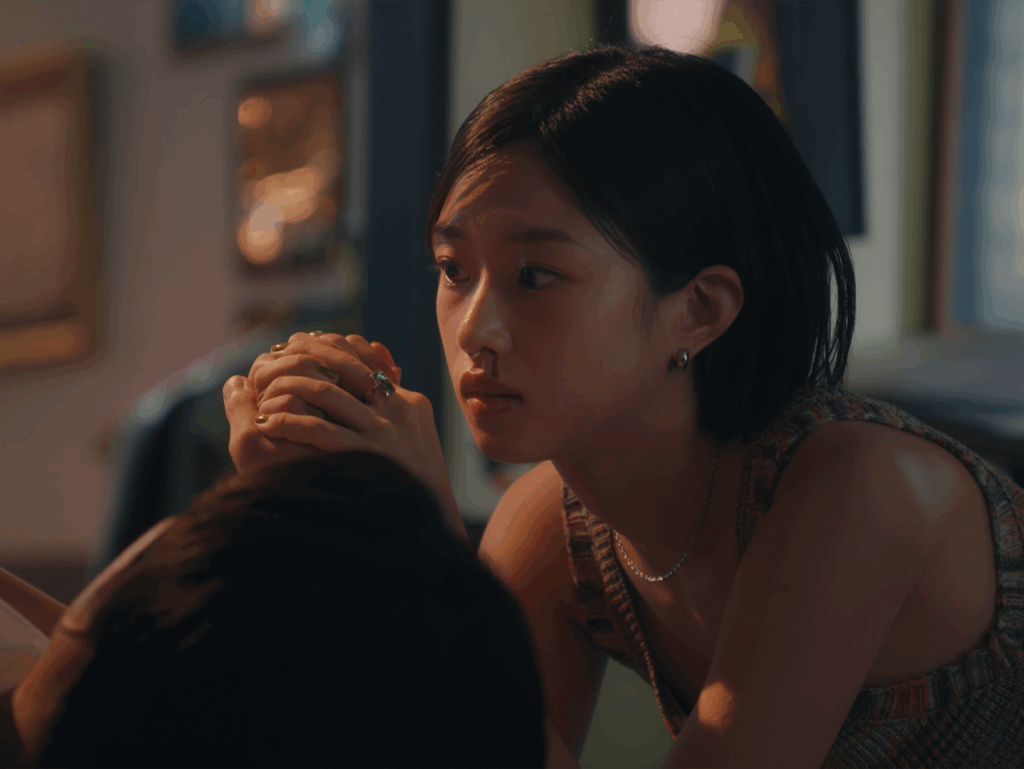

Ariana One of the synopses I read of the film highlights that Kana is trying to live in a patriarchal society. She seems to be adopting some patriarchal features for herself, like taking out her frustrations in a violent way usually associated with men. She’s cheating on her partner in the beginning — that’s also considered something that women don’t do as much as men in society in general. So I wonder how you feel about this description of the film as “a woman navigating patriarchal society”?
映画の粗筋を見たときに、カナが男性上位なこの世界で生き抜いていく姿を描くようなことが書いてありますけど、カナは実は男性がするようなこと、例えば暴力を振るうのとか浮気をするというようなことをしていくのを逆に男性社会の中で男性的な振る舞いをしているのを見たのはとても興味深かかったので、それについて何か言いたいことがありますか。
Yoko Something I often hear from viewers is that if Kana were a man, nothing would be new about this film, we would just criticize her violence. Therefore, nothing is new or interesting about this film. But in the film Kana is a woman, so these comments about “if she were a man” are meaningless. It should be taken as it is. Even if the things she does and her behavior is viewed as being “like a man’s,” there have been women like this and there are women like this. And there haven’t been many movies like that.
見たお客さんによく言われることとして、カナのキャラクターを男性に置き換えたらやっていることはこれまでの映画で見てきたことと全く同じで何も新しいことはなくて、ただの暴力で批判されるべきなことだから…だからこの映画は新しくないし、面白くもない、みたいなことを言う。批判されるときによく言われることだけど。でもカナは映画の中では女性だし、「入れ替えったら」と言うこと自体が何の意味もない。それ以上でも以下でもなくて…まあ、そのやっていることはそれまでの映画の中の男性的な振る舞いと同じだとしても、そういう女性は今までもいるだろうし、いただろうし、今そういう映画がこれまでなかった、少なかったよねと言うことしかない。
Ariana Do you think Kana is a victim?
カナは被害者だと思いますか。
Yoko In her relationships with the two boyfriends sometimes she is the victim and sometimes she’s the aggressor. There are times when she acts aggressively, but for example with the first boyfriend, even though he seems gentle and kind, he can be a little bit manipulative by treating Kana like a child and limiting her independence and agency. In that way she can be seen as a victim. I don’t believe Kana is an aggressor toward society. If I had to say, I suppose she’s a victim of her position as a young woman in Japanese society.
この二人のボーイフレンドとのそれぞれの関わりにおいては、被害者だったり、加害者だったり、どちらにもスイッチングするような関係性があるんですけど。カナが加害者としての行為をしている場合もあれば(被害者としての場面もあります)。例えば、最初の彼氏とかだったら、結構優しいように見えるけど、カナを何もできない子供のように扱って、自由を束縛しているようにも見えるから、そういう意味ではカナは被害者になるし、そこの関係性で被害者ですとは言えないけれども、社会に対して別にカナは加害者ではないし、どちらかと言うか、若い女性として被害を被る局面というのは多いかな…そういう社会が日本にはあるなぁと思います。
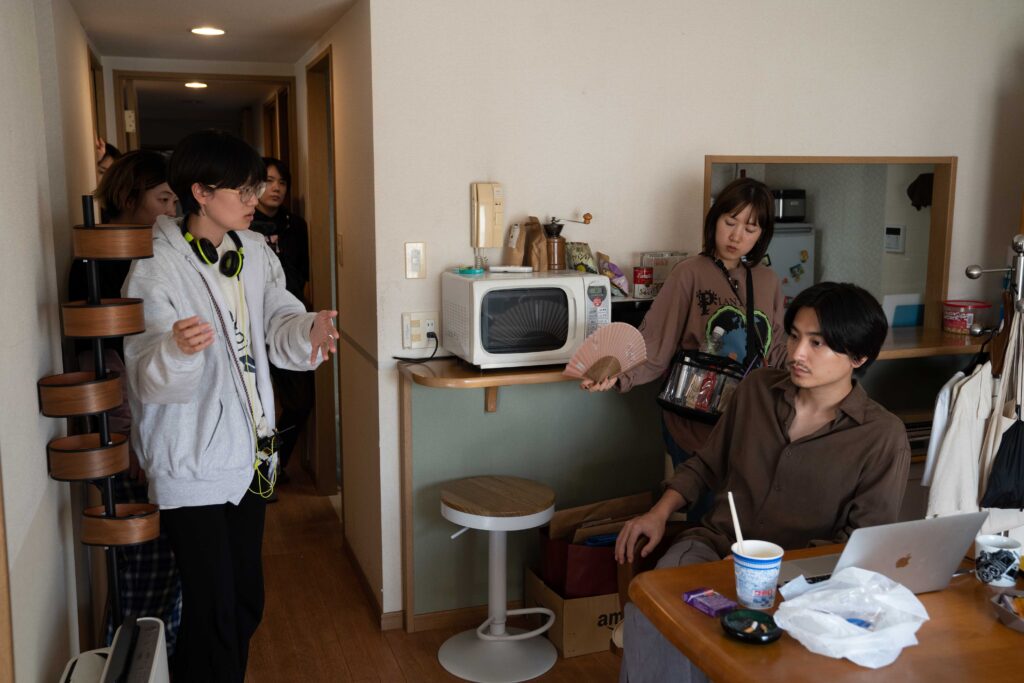
Yoko Yamanaka behind the scenes
“Those of us who were born and raised in Japan but with mixed roots may be able to see Japan as part of a core identity, but somewhere deep down also have a feeling of not belonging or fitting in.”
Ariana There are two scenes where we learn that Kana is Chinese, or her family is of Chinese heritage, and I wonder what role that heritage plays in her struggles. The therapist says that she has trouble communicating or being free to think her own thoughts. Is this struggle to communicate related to her being a person of Chinese descent who can’t communicate with her parents properly?
二つのシーンの中で、カナの親は中国人であるということが出てきます。どうしてそういう設定になっていますか。セラピストと話しているときにカナは自分の考えていることを外に出すことが難しいという話になります。このことは、彼女が中国人の家族や親戚とうまく意思疎通できないという点と関係があるのでしょうか?
Yoko I have a mixed roots background — my mother is Chinese. The actress who plays Kana (Yuumi Kawai) also has mixed roots, although I don’t know exactly where from. She mentioned this publicly in an interview, so I don’t think it’s exactly a secret, but truthfully many actors in Japan [who have mixed roots] hide their ethnic backgrounds. Those of us who were born and raised in Japan but with mixed roots may be able to see Japan as part of a core identity, but somewhere deep down also have a feeling of not belonging or fitting in. I spoke with the actress before writing the script for Namibia and kept this in mind — the sense of being shaken by not knowing exactly “what” we are — as part of the basis of a character with mixed roots. Kana gets angry, she’s violent. It wasn’t my intention to draw a direct connection between these things so simply as if to say “this is why she hits people.” But being conscious of the challenge of forming a core identity and the confusion that creates is perhaps a large part of the background.
私の母が中国人で、あと(主人公役の俳優の)河合さんもどこの国か知らないんですけどムックスルーツがあるということをインタビューで答えたから隠していないと思う。でもやっぱ日本の俳優ってそういうのをあまり言わないという人も多かったりするから、そこには何か問題があるけど…河合さんと脚本を書く前に色々話をしたときに、お互いミックスルーツで、日本で生まれ育ったけど、何か日本に対して根を張っているようなコアアイデンティティを持っていないよねっていうか…どこかこう確固たる自分という存在がすごいルーツが寄る辺ない感じがあるよねという話をしていました。『ナミビア』を書く前に話していたので、脚本を書きながらそのことを思い出したりして、自分が一体何者であるか、みたいなところの「揺らぎ」みたいなものはミックスルーツの人はそもそも根底にあると思っています。カナというキャラクターは怒ったり、暴力を振るいたりすることと、直接結びつけるようなことは全く意図ではないし、「だから殴るのだ」ということではないと思うのですけど。でもそのコアアイデンティティーがこう確たるものが自分で形成しづらいという意識が状態で距離も混乱も大きいのかなと、そういう設定にはしました。
Ariana I also have mixed roots, being half Korean and half white…there were a lot of interesting things in the film that made me think about myself and my own identity.
私もミックスルーツ…韓国とアメリカ(白人)のハーフで『ナミビア』を見て、色々な面白いことが映画に出て、自分のアイデンティティーのことについて考えました。
Yoko This interpretation of the identity aspect of the film isn’t as common among Japanese viewers. But I’m happy that people can see it from that perspective. I’d expect more people to have that view in New York. In Japan, more people responded to the mental health aspect of the film, responding like, “I get it,” or “I don’t get it.” They seem to really latch on to that. But the idea that there are lots of different types of people is a premise that not a lot of Japanese people seem to recognize (particularly considering the way people tend to avoid discussing their different ethnic roots).
そのアイデンティティーの文脈、日本では語る人…いなくはないけど。でもやっぱりその当事者性で見るお客さんは少ないじゃ少ないので…そう、嬉しい。きっとニューヨークはそういう人がいっぱいいるだろうかな。日本はやっぱ、結構、疎通とかそういう精神病的な文脈にみんなすごく反応します。「わかる」とか「わかんない」とか。そっちがすごい気になるみたい。まだまだ成熟していないから、「色んな人がいるよね」という前提が日本人にはまだあまりない。

“It’s like the pureness of childhood, being in the moment and reacting to what’s in front of you.”
Ariana I wanted to ask about one line in particular. During a scene in which Kana is fighting with her second boyfriend, she says: “Where do you get off trying to be a so-called creative? If the world is just filled with things made by guys like you, it’s toxic.” I think we tend to think of creativity and creating things as a good thing. Can you speak about your intention with this line?
一つのセリフについて聞きたいです。カナが二人目の彼氏との喧嘩のときにこう言います:「どのつら下げて ものづくりとかしてんの?あんたみたいな男が作るものが世界に溢れちゃったら毒じゃん。」ものづくりって全体的に良いものというように考えている人が多いのですけれど、このセリフを聞いてハッとしたので、意図を話してほしいと思います。
Yoko For Namibia I created barrier-free materials for the first time. I always assumed that films were a visual art that people would look at, and didn’t consider that there would be viewers who are blind or deaf. Making the accessibility guide was a really impactful experience. I always thought of films as a visual experience, but it makes sense that there would be people with vision impairments who also wanted to experience the film in a theater. It made me consider that there are people being blotted out by the majority and I realized that I hadn’t thought of that at all while making the film. I do think self-expression is a good thing, but when I wrote that line, I hadn’t realized how much there still was that I hadn’t considered.
まさに『ナミビア』で初めてバリアフリー上映の素材を作ったのです。目の見えない人と聞こえない人のために日本語の字幕とか音声ガイドという、特に目の見えない人のために、映画を伝えるために音声ガイドを作った経験がすごい自分の中で大きくて。映画ってもう、映像技術なので、目で見るものだという意識がずっとあって。でも、目が見えない人でもやっぱり映画館で音を感じたりしたいんだ。マジョリティーによって作ったもので、それがとりこぼしてしまう人が絶対的にいるし、なんか映画を作っている時に全然考えていなかったな、と自分ですら気づいたので。もちろんそこを考えて作るべきと思う。まずは「自分の表現」というのは良いと思うのですけど、そういう存在(目が見えない観客とか)もいるということは知った上で、やりたいことはやるべきと思いますが、そのセリフを書いた後ですら、私は気づいていないこと、考えたこともないことがわかりました。
When I create things and then release them to the world, I know that we need to be aware that they can influence the people engaging with them. This is also true for clothes or other goods being created. Of course, when it comes to male creators — or in the case of film, male directors — this has meant that on screen there have been many female characters who were simply convenient to male ideals. There are of course men who are careful in their representations, but some aren’t careful at all. Now that I see more art or films being made by female creators, I realized that I was perhaps forcing myself to enjoy some of the work created by men. Most recently I saw The Substance, and I had this thought like, “Oh yeah, this is the kind of thing I wanted to see!” (laughs) I’m happy that more works like this are being made and lots of different types of people are making lots of different things. So it’s very valuable, I believe, for women and people with all sorts of unique perspectives to use their platform, not just in art but in challenging norms.
何か物を作って、世の中に出すということはその作った物が世界に出てしまうということは、それに触れた人に何かしらの影響が絶対にあるものだって思えないとやっぱりいけないと思ってて、それで洋服でも 雑貨でもなんでもそうですけど…やっぱり男性のクリエイター、映画でいうと、男性監督ばっかりだったこそ、そういう都合の良い女性のキャラクターが、まあ、基本そういうふうになってしまう。気をつけようとしてもそうなってしまうことはあると思うし、気をつけていない人達もたくさんいたと思う。女性の作り手の映画をすごい、自分でも気づいたっていうか、今まで自分は結構無理して、男性作家のものを面白がろうとしているところがあったっていうか。最近『サブスタンス』を見て…(笑)。「こういうのが見たかった!」みたいなことを思ったりする作品も増えたから嬉しいですし、本当に色んな人が色々なものを作ったり…芸術だけじゃなくても規格をするような立場のある人に、女性だったり色んな属性の人が増えると絶対いいなと思います。
Ariana I wanted to ask about the scene with the camping song. In Kana’s conversation with her neighbor, the two of them dance or jump around and play and sing a camping song. And I thought there was kind of an interesting connection to the fantasy or idealization of childhood. Given that Kana mentions the Lolita complex in a different scene and given that Japan is perceived abroad as having a bit of a Peter Pan complex — or idealizing youth and youngness — I was wondering what Kana’s relationship is to childhood, and if the perfect fantasy of childhood puts pressure on people like her.
「キャンプだホイ」のシーン、理想的な子供時代みたいなイメージを思い浮かんだが…あとセラピストとの場面に「ロリコン」の話になったりとか、海外から見た日本のピーターパン・コンプレックスということ…若さとか子供時代をすごく価値を見出す社会のように見られている傾向があるんですけど、その「理想的な子供時代」を送りたいというプレッシャーみたいなものはカナは感じていますか?歌(キャンプだホイ)は何を伝えていますか。
Yoko That might be the first time I’ve heard the “Camp Da Hoi” scene interpreted that way. It’s true that it’s a song learned by a lot of people in elementary school and is the kind of song that elementary schoolers sing around a campfire while away on a trip. I really liked the lyrics because they were so pure, talking about the first time seeing a mountain, the first time seeing a river. It’s like the pureness of childhood, being in the moment and reacting to what’s in front of you. And “let’s be friends.” It’s an interesting interpretation (laughs). But I wasn’t conscious of all of that. Certainly, in Japanese society today a lot of young people are using phrases like “oya-gacha” (parent lottery) to suggest that from the very beginning life is unequal and unfair based on who you get as parents. They’re saying “parent lottery” and “toxic parents,” and suggesting that because it’s rigged from the start they’re not even going to try. I understand their feelings, and the pressure of society that makes them feel hopeless. There are definitely a lot of people who believe things like, “If I had a perfect childhood, I wouldn’t be like this.” The idea that people are responsible for their own lives is totally unbearable. There’s a sense that it can’t be their fault that they didn’t do anything wrong and yet their lives aren’t turning out the way they wanted.
初めて「キャンプだホイ」の解釈として、初めて言われたかも。確かにあの歌は小学校とかで習う人がいたりするみたいなので、なんか小学校のキャンプファイアの旅行みたいな時に歌う。あの歌詞が結構純粋にいいなと思って、「初めて見る川」、「初めて見る山」みたいなすごくピュアな…確かに子供時代のピュアな気持ちですよね。その何もしがらみなく、初めて見るものにちゃんと反応できるっていうか…友達になろうみたいな歌だと思うし、確かに面白い解釈ですね。(笑)言われてみたら、面白いし、そうだなと思うけど、自分でそこまで意識してやってたわけじゃなくて…でもやっぱり日本の若い人達は今、本当すごい「親ガチャ」とか、最初からみんな不平等で理不尽だっていうことが耐えられないから「親ガチャ」とか「毒親」とか言って、生まれた時から自分は備わっていないものというふうに諦めている人は多いですね。でもそれって結構、「だから自分は変われないし、仕方ないんだ」と言う。気持ちはわかるけど、そういうふうに感じさせる社会の圧力とか希望がない感じとかがあるんだろうなと…「完璧な子供時代を過ごしてたら、今、自分はこうじゃないのに」と思っている人は多いと思います。自分の人生の責任を自分で取らなきゃいけないということが本当にみんな耐えられないと思います。「自分が何も悪いことをしていないのに、自分の人生が全然うまくいっていない」ということはやっぱり自分のせいにはできないことかな。
I actually didn’t know the song that appears in the film, “Camp da Hoi.” That scene wasn’t in the script. The script just had Kana and her neighbor talking around the fire, but while preparing the campfire for filming, a member of the art staff began singing the song. Half the staff knew it and the other half didn’t. It might be a regional thing, or depending on what school you went to. Anyway, I thought the lyrics were really great and it was perfect for the situation so we added it in an improvisational manner. I didn’t think too deeply about it.
「キャンプだホイ」の歌、私は知らなかった。あれは脚本にないシーンで…脚本状ではただ焚き火を囲った二人は喋って終わりだったんですけど、そのシーンの撮影の準備している時に、日を準備している時に、美術のスタッフの子が「キャンプだホイ」を歌い出して、そしたら、私知らなかったから「何その歌」って聞いたら、そこにいたスタッフが半分知ってて、半分が知らなかった。多分地域性がある。学校に寄るみたいなことで、知っているスタッフが歌ってもらったんですよ。で「すごい良い歌詞、この状況にとてもピッタリ」と思って、結構即興的に採用しているので、深く考えなかった。
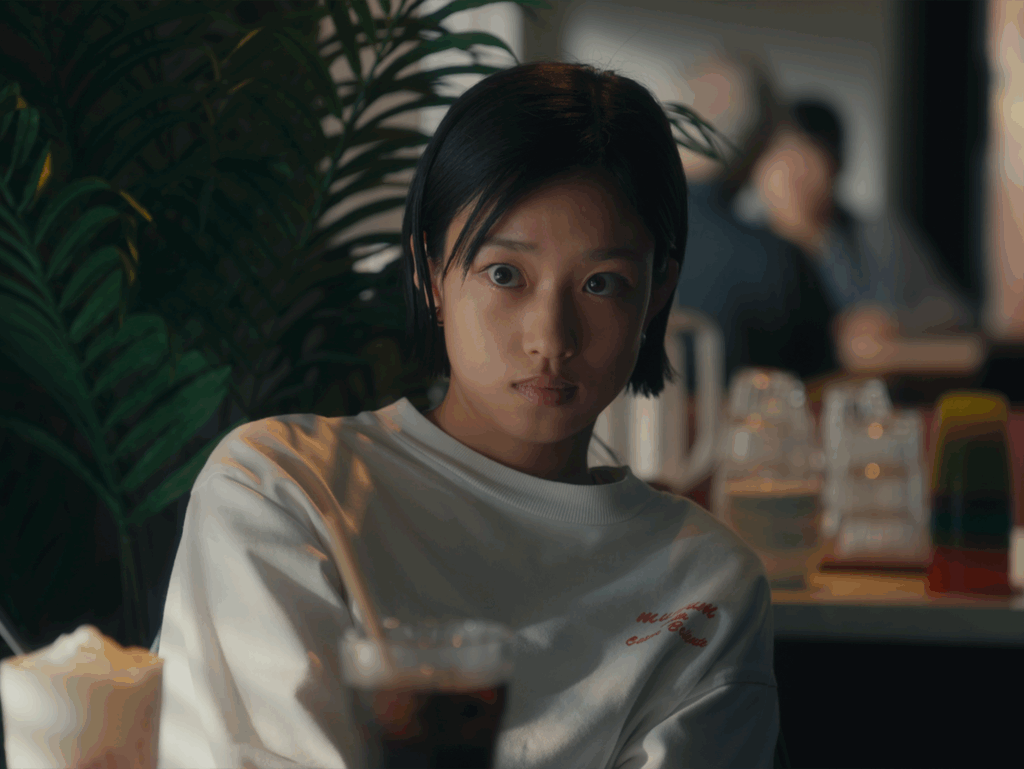
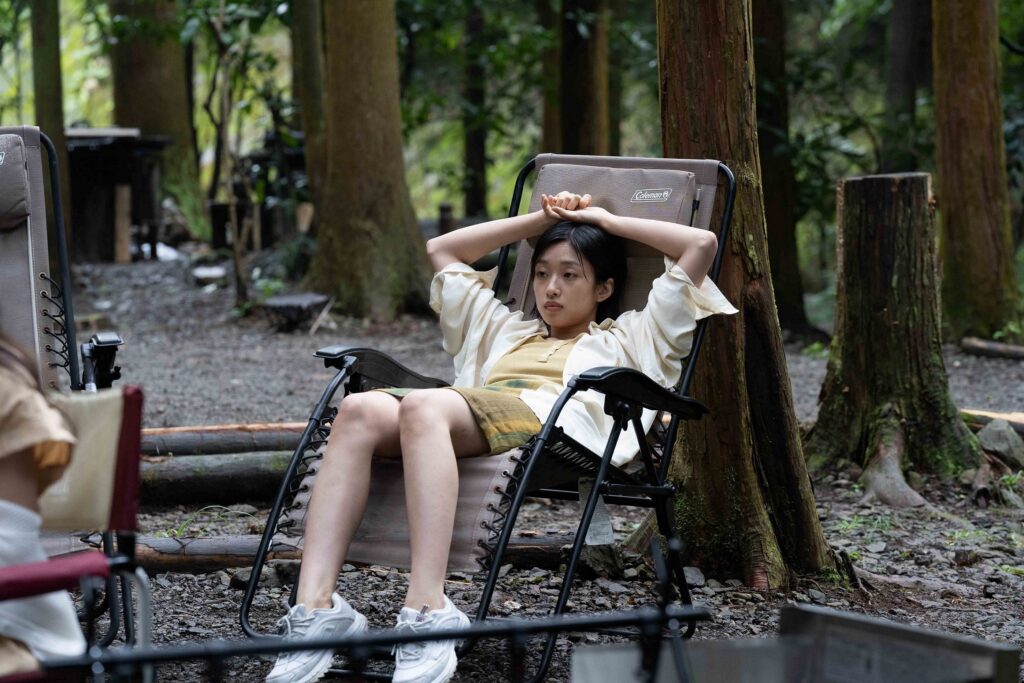
Ariana Could you speak about why you named the film Desert of Namibia and why you included the livestream video from Namibia in the film?
最後の質問に、なぜ『ナミビアの砂漠』というタイトルにしましたか。あと、ナミビアの砂漠でのライブストリーム動画もなぜ映画に入れたのか、ちょっと話してください。
Yoko Kana is someone who would like to be with other people at all times. I wrote her as someone who doesn’t know what to do when she’s by herself. But in the film, her first boyfriend goes on a business trip, and I had to think about what she would be doing while she’s alone. What would a girl who doesn’t know what she wants to do do? And I remembered this video channel of the desert. It was really popular during the pandemic, even in Japan. People found it healing. In writing the script, I saw it as a good representation of this sense of distance Kana has with things around her. For example, towards her lovers or friends, Kana is pretty rude or neglectful and insensitive. But when it comes to the people she has some distance from — like her neighbor or the therapist — she listens to them with surprising earnestness. And Kana’s not alone in this. There are plenty of scenes in movies where someone can’t share their worries with the person who’s closest to them, but then tells everything to a person they just met that day. I thought “the desert of Namibia” was the most extreme example of something totally divorced from Kana, it’s a very distant place that has nothing to do with her, and yet she feels relaxed by it. And that metaphor became the title.
カナがいつも誰かと一緒にいたい、一人でいても何をしたらいいかわからないようなキャラクターなんじゃないかなって脚本を書いたと思って、でも映画の中で一人目の彼氏が出張に行って一人になってしまうという時に、カナ何するのかなって、やりたいことがわからなかったりする子は何しているのかなって考えた時に、(ナミビアの砂漠のライブ配信)のことを思い出して、何も考えずにあれを見て癒される人が日本でも結構コロナの時に流行っていたしてたんですね。それで知ったんですけど。そこから脚本を考えた内に「ナミビアの砂漠」というものがカナと物事との距離感の象徴に思えて…例えばカナは恋人とか友達に対してはすごく雑で何がしろにするところがあると思うんですけど。近い関係の人にはとても失礼っていうか…でも隣に住んでいる人とか、お医者さんとの話とか、意外と距離感が遠い人の話は素直に聞くようなところがあるなと思って。それはカナに限らず、みんなそうだと思ってて…親しい人に話せない悩みでもなぜかなんか今日知り合った人にだったら話せる。そういうシーンもよく映画で見るし、人との距離感の象徴の一番極端なものがやっぱり「ナミビアの砂漠」っていうカナにとって何も関係ないとカナが思っていて遠くにある場所と言う…そこにカナはすごく安らかっていうか、安心した気持ちでいられるというふうに思って、それが象徴的だなと思ってタイトルにしました。
Ariana I think it’s when you see yourself in somebody that you’re meaner to them than you would be to a stranger who is more other, more unknown. When you get to know them, you see the similarities between you and them. This is just my personal pop psychology interpretation, but I’m meaner to the people I’m close to, because I see some of myself in them, and I can attack them for it, because I’m attacking myself, I think.
私の意見ですけど、私は親しい友達を見るときに、彼女、彼の中に自分を見てしまう。だからその人にアタックするわけじゃないけど、自分に攻撃してしまう。そういう反応をしてしまうことがあるので、あまり知らない人だと、その人がよくわからないからその中に「自分」を見ることがなくて、もっと安心して心開くことができるじゃないかな。
Yoko Yeah, I think so too. (laughs) This movie is really a bit like a mirror. The things people say about it are totally scattershot, it’s almost as if they’re talking about themselves, not the film. At least there were a lot of people like that in Japan, interestingly.
そう、そう思います。(笑) 本当にこの映画自体が鏡みたいになってて、見る人によって言ってることがバラバラで、それはなんか、「自分の話をしてるんじゃない」みたい、映画じゃなくて…という人がかなり日本では多くて、それは本当に面白かったです。
Ariana Maybe it’s because Kana’s childhood and upbringing weren’t really shown in the film, so viewers projected their own reasons behind why she did what she did.
カナの子供時代の背景は映画に説明していないので、もしかして観客は自分の経験、自分の解釈を反映して、カナの行動を理解してみたのかな。
Yoko When we see another person’s life, we’re really only seeing a small sliver of them. I think most people understand that — well some don’t but…In any case, I’m of the belief that we can’t ever totally “get” another person, but it seems that a lot of people don’t see it that way. A lot of people want to label and explain “this person is like this.” It’s precisely because I don’t like that tendency [to characterize people] that I made this film, but in the end a lot of people seem to want to determine that Kana is this or that.
こう生きてて、他人のことが自分が見えてるその人が一部しかないということがみんなわかっている。まあ、わかってない人もいるけど…だから他人って自分にとって訳わからない存在だというのって当たり前だと私は思っているけど、意外とみんなそうではなくて、やっぱりみんなラベリングしたいし、「この人はこう」っていうわかりやすい何かが欲しいというのが、それが嫌だったから映画を作ったはずですけど、結局…やっぱカナはきっとこういうことが昔あったから、「『こう』に違いない」みたいな「決めたい」という人がいっぱいいて。
Ariana Oops, sorry. I also was thinking about myself when I watched the film.
ごめんなさい。私もこの映画を見て自分のことを考えたね。
Yoko No, I mean more like people who are convinced of things that weren’t in the film at all, like “Kana must have been a victim of sexual abuse.” Everyone is like this, we know our own traumas well, and they’re connected to our current selves, but we aren’t totally conscious of it. These vague factors build up and make us the way we are. That’s the cliché.
いや、でも映画には書いてないことを言う人も多いですよ。例えば、「カナはきっと性的虐待を受けていたに違いない。」みんなそうで、みんな自分のトラウマがはっきりわかってて、「あのことが繋がってるから今こうなんだ」、誰もはっきり自覚していないと思うから。そういう曖昧な要素が重なってきた上で今の自分がいるという状態で、なんか当たり前だと思ってるのですけど。
Ariana It’s a bit like the “parent lottery.” We explain our present selves based on our past experiences. But it’s a bit dangerous isn’t it.
「親ガチャ」みたいですね。今までの経験のせいで今の自分を説明する。あれはちょっと危ないですね。
Yoko I think it’s okay for things to be a little ambiguous. But of course, when it comes to movies everyone wants all the answers. (laughs.)
もっと曖昧なものでいいと思います。でも映画はやっぱりみんなはっきりして欲しいみたいですね。(笑)
Desert of Namibia opens in select US and Canadian theaters starting May 16th. Check Kani Releasing for more details.

